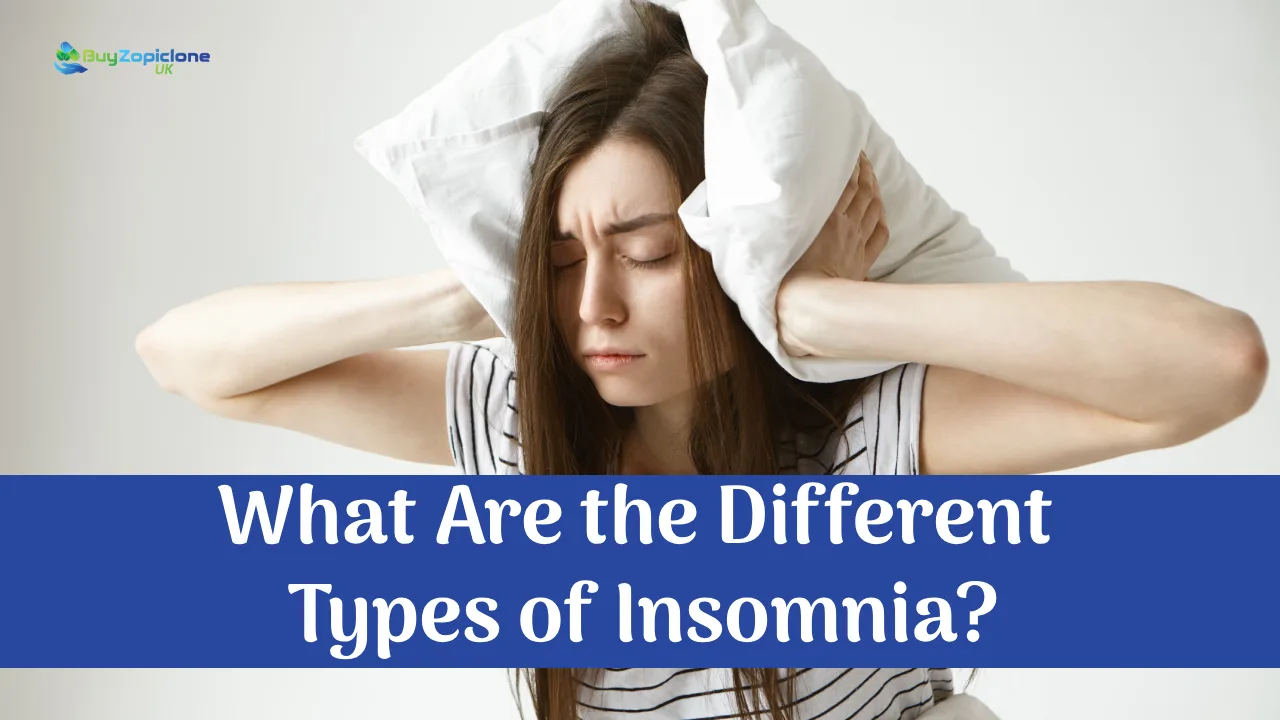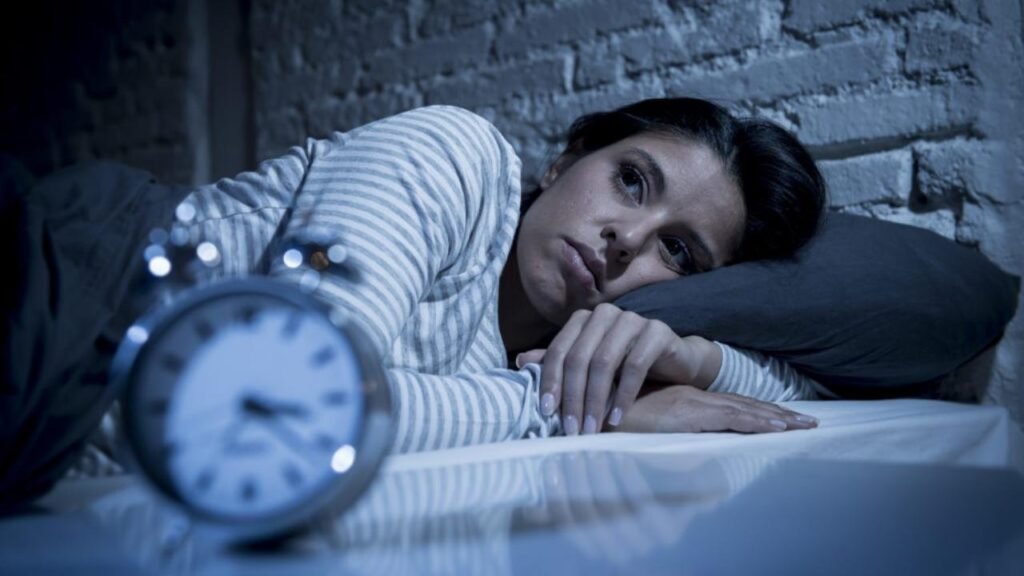Sleep is essential to our health, yet millions across the UK struggle with getting a good night’s rest. Whether you’re tossing and turning for hours or waking up long before your alarm, insomnia can disrupt both your physical and mental well-being. It’s more than just an occasional restless night — insomnia can be a chronic problem with serious health consequences.
Understanding the different types of insomnia is the first step in getting the help you need. Each type has unique symptoms, causes, and treatment approaches. Whether your sleep issues are temporary or long-lasting, knowing which type of insomnia you’re dealing with can make a significant difference in finding the right solution.
In this article, we’ll explore the types of insomnia, their symptoms, and how they are treated — especially in the UK where environmental and lifestyle factors often play a role. We’ll also touch on medically approved solutions like Zopiclone, one of the most effective short-term treatments prescribed today.
Looking for a reliable sleep aid? You can buy Zopiclone online UK from our trusted pharmacy for discreet, fast delivery.
Understanding Insomnia: A Quick Overview
Insomnia is a sleep disorder that affects your ability to fall asleep, stay asleep, or both — even when you have the time and environment for proper rest. It can significantly reduce your quality of life, leading to fatigue, mood swings, poor concentration, and even long-term health problems if left untreated.
In the UK, insomnia is one of the most common sleep-related issues, affecting approximately one in three people at some point in their lives. It can be acute (short-term) or chronic (long-lasting), and it often stems from stress, lifestyle habits, medical conditions, or mental health concerns.
Unlike general sleep troubles that pass within a night or two, insomnia tends to persist — which is why it’s important to identify the type of insomnia you’re experiencing and seek the right form of treatment. Depending on the cause and severity, many people in the UK turn to professional help, therapy, or approved medications like Zopiclone for relief.
The 3 Main Types of Insomnia
When it comes to sleep disorders, not all insomnia is created equal. Experts generally classify insomnia into three main types based on duration and frequency: acute, chronic, and transient insomnia. Understanding these distinctions can help you take the right steps toward diagnosis and treatment — especially if you’re considering medical options like Zopiclone, a trusted short-term solution for many in the UK.
| Type of Insomnia | Description | Common Symptoms | Duration |
|---|---|---|---|
| Acute Insomnia | Short-term sleep disruption due to stress or illness | Difficulty falling or staying asleep | Less than 1 month |
| Chronic Insomnia | Long-term sleep issues lasting over a month | Persistent difficulty sleeping, daytime fatigue | 1 month or longer |
| Sleep-Onset Insomnia | Trouble falling asleep at the beginning of the night | Takes longer than 30 minutes to fall asleep | Can be acute or chronic |
| Sleep Maintenance Insomnia | Waking frequently or too early during the night | Interrupted sleep, difficulty returning to sleep | Can be acute or chronic |
| Terminal Insomnia | Early morning awakening with inability to fall back asleep | Waking up several hours before alarm time | Can be acute or chronic |
1. Acute Insomnia
Acute insomnia is a short-term form of sleep disruption that typically lasts a few days to a few weeks. It’s often triggered by stressful life events such as job loss, relationship issues, bereavement, or even something as simple as travel-related jet lag.
You might experience trouble falling asleep or waking up several times during the night. Although uncomfortable, acute insomnia usually resolves on its own once the underlying stressor is addressed.
Common Triggers:
-
Stressful news or life changes
-
Temporary illness or pain
-
Changes in work schedule
-
Environmental disturbances (e.g., noise, light)
2. Chronic Insomnia
Chronic insomnia is more serious and lasts for at least three nights a week over a period of three months or more. It may be linked to medical conditions, anxiety, depression, or poor sleep habits. This form of insomnia can greatly impact your health, mood, and daily functioning if left untreated.
In many cases, chronic insomnia requires a structured treatment plan that may include Cognitive Behavioural Therapy (CBT-I) and prescribed sleep aids like Zopiclone. If you’re struggling with long-term sleeplessness, consult a UK-based sleep specialist or GP.
Symptoms of Chronic Insomnia:
-
Persistent difficulty falling/staying asleep
-
Daytime fatigue and irritability
-
Reduced work performance or concentration
-
Reliance on alcohol or caffeine to cope
3. Transient Insomnia
Transient insomnia is the mildest form. It typically lasts less than a week and resolves quickly. It’s usually caused by temporary changes in routine, stress, or environment — such as sleeping in a hotel, staying with relatives, or changing time zones.
Although usually harmless, frequent episodes of transient insomnia can build up and contribute to chronic patterns if not managed properly.
Other Classifications of Insomnia
While insomnia is often classified by duration (acute, chronic, or transient), it can also be categorized based on its underlying causes and how it affects your sleep cycle. These additional classifications offer more insight into what might be causing your sleep troubles — and how best to treat them.
1. Primary Insomnia
Primary insomnia means your sleep issues aren’t directly linked to any other medical, psychiatric, or environmental cause. It’s an independent condition that often develops due to poor sleep habits, long-term stress, or disruptions in your circadian rhythm.
This type of insomnia can persist for months or even years, making it harder to treat. Many people in the UK dealing with primary insomnia often benefit from a combination of lifestyle changes, behavioural therapy, and in some cases, prescription sleep aids like Zopiclone, which you can buy online in the UK through trusted pharmacies.
2. Secondary Insomnia
Secondary insomnia occurs as a result of another issue — whether physical or psychological. Common causes include:
-
Chronic pain or medical conditions (e.g., arthritis, asthma)
-
Mental health disorders (e.g., depression, anxiety)
-
Medications that disrupt sleep
-
Substance abuse (alcohol, caffeine, nicotine)
To treat secondary insomnia effectively, it’s crucial to address the root cause. If the underlying condition is managed well, sleep patterns usually improve as a result.
3. Onset, Maintenance, and Terminal Insomnia
-
Sleep Onset Insomnia: Trouble falling asleep at the start of the night.
-
Sleep Maintenance Insomnia: Waking up frequently during the night.
-
Terminal Insomnia: Waking up too early and being unable to return to sleep.
Each of these subtypes may require different treatment approaches, so identifying your sleep pattern is important.
Causes of Insomnia in the UK: What Makes It Worse?
Living in the UK presents unique lifestyle, environmental, and cultural factors that can increase the risk of insomnia. From long winter nights to high stress levels and irregular work patterns, understanding what causes and worsens insomnia is essential for effective treatment.
1. Stress and Mental Health Issues
Mental health conditions like anxiety, depression, and PTSD are among the top contributors to insomnia in the UK. A high-pressure work environment or personal challenges can lead to racing thoughts at night, making it difficult to fall or stay asleep.
2. Shift Work and Irregular Schedules
A significant number of UK residents work in healthcare, transport, and hospitality—industries that often require night shifts or irregular hours. This can disrupt the body’s natural circadian rhythm, leading to chronic sleep difficulties.
3. Noise and Urban Living
Living in bustling urban areas such as London, Manchester, or Birmingham exposes people to street noise, sirens, and late-night activity. This kind of environmental disruption is a major factor in both acute and chronic insomnia.
4. Excessive Screen Time
Use of smartphones, tablets, and laptops before bed — especially common in younger demographics — interferes with melatonin production and sleep onset.
5. Substance Use
Heavy caffeine consumption, alcohol use, and smoking are all sleep-disrupting habits that are common among UK adults.
💡 If you’re dealing with sleepless nights and need a fast, effective solution, many people choose to buy Zopiclone online UK for short-term insomnia relief.
Also Read: Why Insomnia Occurs During Pregnancy: Causes, Symptoms, and Tips for Better Sleep





